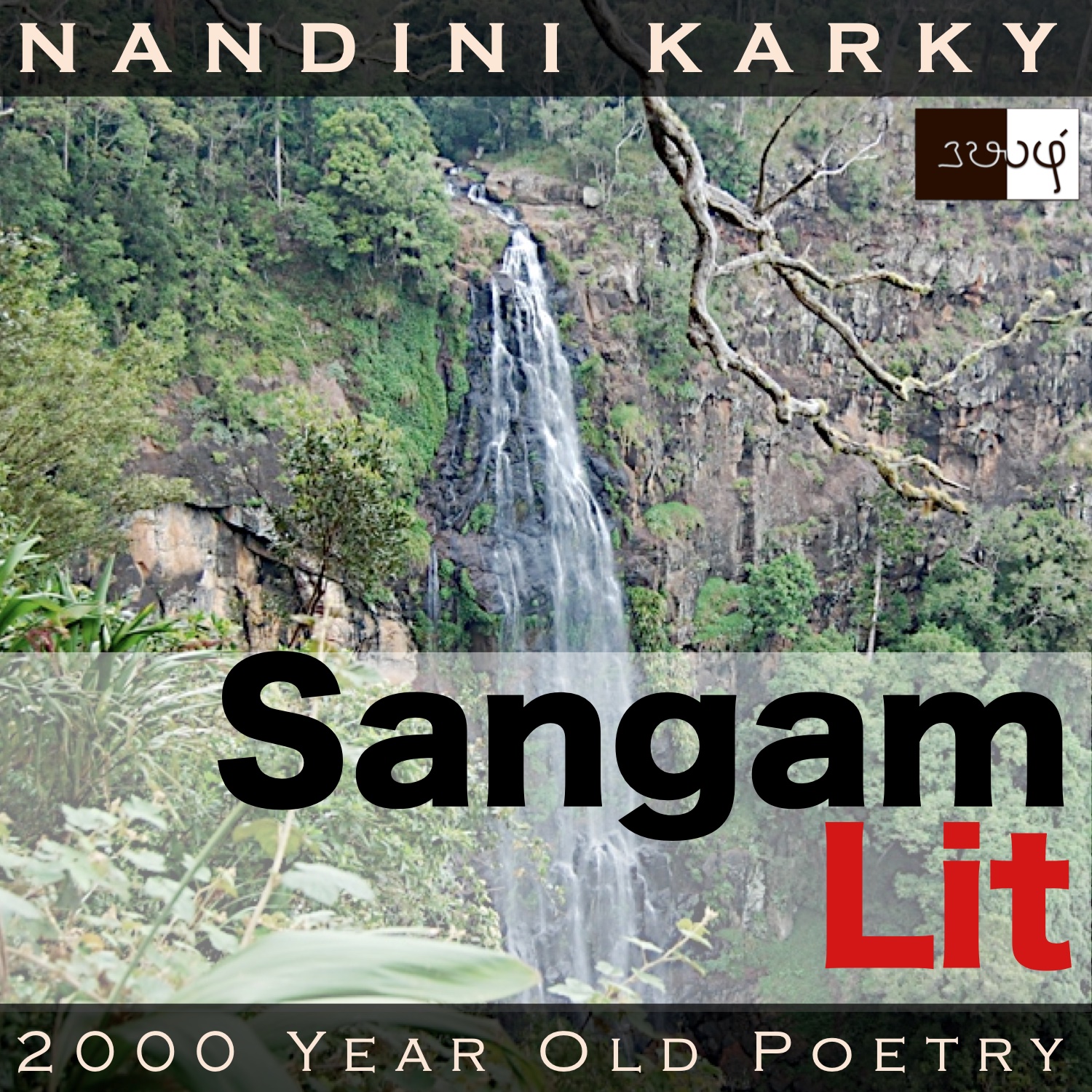Podcast: Play in new window | Download
Subscribe: Apple Podcasts | Spotify | Amazon Music | Android | iHeartRadio | TuneIn | RSS | More

In this episode, we perceive scenes from a mountain country, echoing the love life of a lady, as depicted in Sangam Literary work, Kurunthogai 88, penned by Madurai Kathakkannanaar. Set in the mountains of ‘Kurinji’, the verse speaks in the voice of the confidante to the lady, conveying the man’s intention to tryst with the lady by night.
ஒலி வெள் அருவி ஓங்கு மலை நாடன்,
சிறு கட் பெருங் களிறு வயப் புலி தாக்கித்
தொல் முரண் சோரும் துன் அருஞ் சாரல்,
நடு நாள் வருதலும் வரூஉம்;
வடு நாணலமே-தோழி!-நாமே.
Elements of land and life dot this verse! The opening phrase ‘ஒலி வெள் அருவி’ meaning ‘roaring white waterfalls’ fills our ears with the sound of a lush mountainside. In ‘சிறு கட் பெருங் களிறு’ referring to ‘a small-eyed, huge elephant’ and ‘வயப் புலி’ referring to ‘a powerful tiger’, the quintessential elements of this landscape can be seen. Note how Sangam poets have a way of focusing on the ‘small eyes’ of the elephant. I think the smallness of the eyes in this animal catches their attention, only because of its contrasting enormous size. These two animals seem to be constantly fighting in the eyes of the Sangam folks, who characterise this tussle with the words ‘தொல் முரண்’ or ‘age-old conflict’. ‘நடு நாள் வருதலும் வரூஉம்’ echoes the core message of the verse for it means ‘at midnight, he shall come’. Ending with the words ‘வடு நாணலமே-தோழி!-நாமே’ meaning ‘we should not feel shy about the censure, my friend’, the verse invites us to explore this mountain and mind terrain.
Flowing waterfalls and fighting animals throb with the beat of hidden emotion! The context reveals that the man and lady had been leading a love relationship and that the man had been trysting with the lady by day. One day, the confidante approaches the lady and says to her, “The man, in whose mountain peaks resound white cascades, will be arriving at midnight, walking through inaccessible slopes, wherein a small-eyed, huge elephant attacks a strong tiger, propelled by its long-standing grudge, and becomes exhausted. But, we should not be ashamed of the blame, my friend!” With these words, the confidante is conveying the inevitability of the man’s tryst with the lady by night.
Time to unravel the tiny nuances! The confidante starts by zooming on to the roaring waterfalls that seem to arise in the man’s tall mountain peaks. After that description of the man’s country, the scene shifts to a mountain slope, where the forever fight between a small-eyed elephant and a fierce tiger is unfolding. Here, we see the elephant tiring out after its tussle. As we move on, the confidante explains that she has mentioned that difficult spot in the slopes only to say that the man will come walking there at midnight. And finally, she turns to the lady and says that the lady must not be ashamed of what blame may befall her because the man chooses to tryst with her by night, under these dangerous conditions!
When talking about how the waterfalls in the man’s country rise in the peaks and flows down to make the land beneath fertile, the confidante is placing a metaphor for how the man must come down from his high place to fill his life and the lady’s life with joy. In revealing the dangers of the mountain slopes, where elephants and tigers are in perpetual fight, yet again, the confidante talks about how some events are inescapable. Even though the elephant knows it’s a pointless struggle which will drain it out, it keeps moving in the same direction. And through this, the confidante tells the lady that the man coming to meet the lady amidst these dangers too, is an inevitable part of the natural order of things and that the lady must receive him, without holding any guilt for his risk-filled action in choosing to tryst with her by night. The aspect of this verse that I would like to focus on, is the deep understanding about the inevitable natural order that may push us in unexpected paths that the mind fights against but towards which, the heart flows!




Share your thoughts...